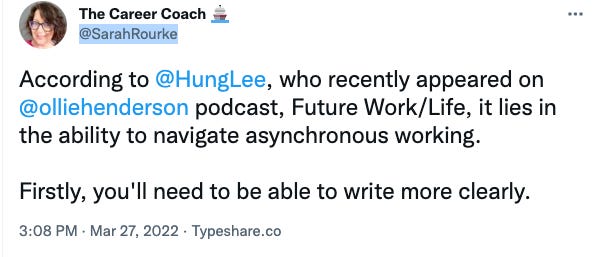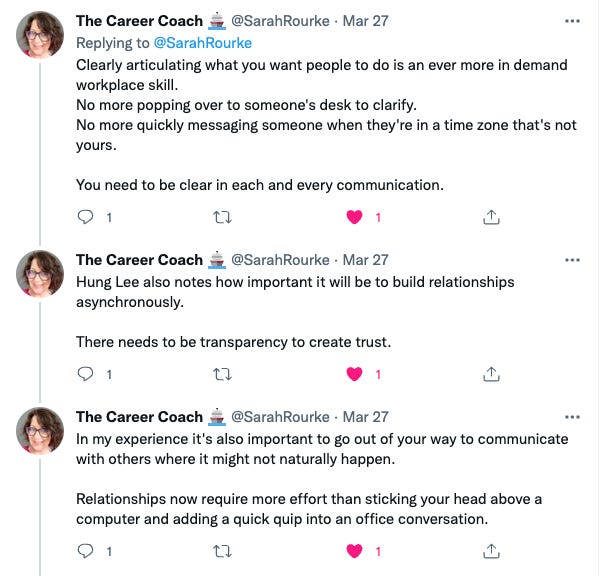Future Work/Life is a regular newsletter in which I share ideas, bring you interesting stories and articles, analyse industry trends and offer tips on designing a better work/life. If you enjoy reading it, please share it!
I’ve been very busy over the past few weeks interviewing the final contributors for my book, Work/Life Flywheel, which is 75% complete. I’ve certainly written a lot of words. The question is whether they’re the right ones! I’ll leave you all to judge when it’s published in January next year.
I’ve also taken on a further challenge, which more than one person has commented sounds crazy in the circumstances.
After a few recommendations, not least from Christopher Lochhead, I signed up for Ship30for30, and have been shipping ‘atomic essays’ every day for the past 18 - only 12 more to go. Although the cohort-based course is primarily designed to help people establish a daily writing habit, this is something I’ve already done over the past couple of years.
Putting my thoughts to paper (or screen) has not only helped me discover what I wanted to do next in my career, it’s led to so many new opportunities that I recommend the practice to anyone who’s going through any kind of transition.
The real reason I signed up for Ship30for30 now, though, is to test out some of the ideas for the book. At this point of the process, I’m using analytics to determine what makes the final cut and the data has so far thrown up some interesting insights. Not least, people seem to be interested in the process of writing a newsletter and book, while hosting and producing a podcast, alongside my various other ventures.
With that in mind, just in case you’re tempted to start writing or podcasting, I thought I’d share two of the best performing atomic essays from the past couple of weeks. I hope you find them useful.
Cheers,
Ollie
5 ways writing has helped me pivot my career
Over the past two years, writing has played a crucial role in my career pivot.
While my objective was never to become 'a writer', the act of writing has changed my approach to work and life. I now publish for people to read, but I'd do it even if no one was interested - the process itself is enough reward.
What's more, the benefits have positively impacted my mental health, relationships and even perception of time.
Here's how:
1. Rediscovering purpose and identity:
As I considered what to do next in life, writing helps me align what matters most, my unique skills, available opportunities and providing for my family.
2. Defeating imposter syndrome:
Transitions are never easy, but simply writing down my feelings quietens my monkey mind and expunges self-doubt.
3. Exploring new ideas:
During an intense learning period, free-writing and long-form articles expose things I don't yet clearly understand and consolidate my expertise.
4. Creating a progress portfolio:
While it's easy to cringe or shake my head at something I've written about in the past, documenting my work is the secret to successfully measuring and accelerating my progress.
5. Slowing time:
Everyone experiences the feeling of time flashing by. I've built an external memory log by recording one key achievement and a story-worthy moment every day, meaning life no longer blurs into one.
Writing is a catalyst for positive changes in your work/life.
Experiment with different modes of writing, and you'll unlock immediate benefits, which will compound over time, creating a platform for your career to evolve and grow. Good luck!
How creating (and sticking with) a podcast will help you pivot your career
18 months ago, I launched my first podcast from scratch. Since then, it's become a Top 10 Careers Podcast and has been the launchpad for my career pivot. These are the lessons I've learned.
It might seem like everyone has a podcast, but the reality is most people give up after a handful of episodes.
Why?
Because it's hard work and the rewards are slow to come. Unless you reframe why you're doing it.
You don't need to be Tim Ferris to be 'successful'.
Keeping motivated means being clear about your own reasons for spending the many hours it will take to produce and share content consistently.
For me, it begins and ends with curiosity and a love of learning.
Here are five tips that will increase your chances of being among the few podcasters that stick with it:
Don't overthink getting started:
There are some amazing tools that allow to you start cheaply and easily. I use Zencastr for recording, Uppbeat for music, Descript for editing and Acast for distribution.
Optimise for interesting
Curiosity to discover more about someone's work is a signal you've identified a potential guest, so do it! Don't be shy about contacting them - most people will reply (even if they don't always say yes!).
Break into manageable chunks:
A weekly podcast forevermore is a huge commitment. The simple alternative is to run it in seasons - create clusters of recordings and then release them in bursts, giving you breaks in between.
Listen and learn:
Podcasts are an incredible way to connect with people and accelerate your learning, which means careful preparation, active listening and a real conversation!
Personal, not audience growth:
Growing an audience can take time, so focus on the value each conversation produces for you and the people who are listening.
My show has created opportunities and relationships I'd never have imagined. Good luck producing yours!
Any Other Business:
I swing from taking advantage of technology to help with my productivity to doing everything I can to escape it. In this FT article, the ‘Undercover Economist’, Tim Harford explains why “Technology has turned back the clock on productivity”. He argues that:
“Tools such as computers tempt highly skilled, highly paid people to noodle around making bad slides”
Amongst other observations about the pros and cons of technological innovation for knowledge workers, he cites Cal Newport’s work, which argues that:
“…knowledge work is long overdue a similar rethink. How often is office work assigned and prioritised by random pestering? Certain disciplines, including producing a daily newspaper, have developed a clear workflow that doesn’t depend on long email chains. A lot of knowledge work, however, is still in the “wander in and pester” stage.
Newport argues that managers and administrators alike should be protecting specialists from distraction, and that we can do much better if we rethink our processes from the ground up.”
Tim will be appearing on the next series of the Future Work/Life podcast, so subscribe now on your podcast player of choice to make sure you don’t miss it.
More on productivity from MIT Sloan Management Review. This time, they outline ‘The case for 'sustainable productivity' and how to measure it’. The authors share the reasons why companies that fail to address the conflict between productivity and employee well-being risk losing employees. The three steps they recommend are”
Define the well-being problem:
“When we see turnover, how much of that is burned out, and how much of that is fed up? It’s the same thing with engagement. Every job, every role, and every industry can have a version of both, but I do think it's a worthwhile area for exploration and diagnosis. To what extent are people reacting to the intensity of the last few years, versus structural issues that long predated the pandemic?”
Implement a new model of productivity measurement:
“The No. 1 way to use [employee activity] data effectively is to do so in a way that supports your employees. That means when you collect insights, you’re transparent with those insights — and you’re then responsible for taking action to ultimately improve the workplace.”
Use insight to influence new behaviours:
“How do you tie the activity to the positive outcomes that you want to see for your business? That’s how you make the case for sustainable productivity. If you don't look at the inputs and you only look at the outputs, you put sustainability and value at risk.”
No great surprise given the events over the past couple of years, but this Mckinsey research is notable because it shows that an outsized proportion of those leaving corporate roles to become self-employed are parents. The main reason? Having more control of their working hours.
As this trend continues to play out, I wonder whether it will shake organisations into accelerating their thinking about personalising work and jobs to adapt to their existing workforce. You’d hope so, otherwise, the current hiring challenges aren’t going away any time soon.
Here’s the more interesting data the report shares:
As far as recommendations on how to keep them, the headlines are:
Embrace radical flexibility
Get more creative with childcare support
Let them go - and make a concerted effort to get them back (in other words, let them have a break for a bit - they need it!)
And finally, I’ll be writing more about this over the coming weeks, but Sarah Rourke (@SarahRourke) summarised one of the key insights from my conversation with Hung Lee well in this Twitter thread:










